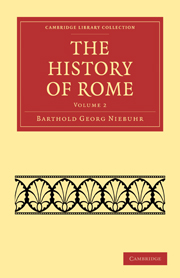Book contents
- Frontmatter
- PREFACE
- Contents
- INTRODUCTION
- The Latin State
- The League with the Latins
- Of the Colonies
- On the Rights of Isopolity and Municipium
- On the Franchise of the Latins
- The League with the Hernicans
- The Wars with the Volscians and Æquians, down to the end of the Veientine War
- The Office of Warden of the City
- The Internal Feuds of the Patricians
- Of the Public Land and its Occupation
- The Assignments of Land before the time of Sp. Cassius
- The Agrarian Law of Sp. Cassius, and his Death
- The seven Consulships of the Fabii
- The Veientine War
- Internal History from the Destruction of the Fabii to the first Pestilence
- The Legend of Coriolanus
- The Wars with the Volscians and Æquians down to the Peace of 295
- The Æquian War down to the Decemvirate
- Disasters and extraordinary Phenomena
- Civil History of the eleven Years preceding the Decemvirate
- The first Decemvirs, and their Laws
- The second Decemvirate
- The first Year after the Restoration of Freedom
- Civil Commotions down to the Constitution of 311
- The Consular Military Tribunate
- The Censorship
- Civil Affairs from the Year 311 down to the last Veientine War
- On the Pay of the Troops
- The Wars down to the Last with Veii
- The last War with Veii
- The other Wars down to that with the Gauls
- Internal History down to the War with the Gauls
- Physical History from 305 to 365
- On the Gauls, and their Immigration into Italy
- The War with the Gauls, and the Taking of Rome
- On the Olympiad and Year of the Taking of Rome
- Rome after the Departure of the Gauls
- The Wars down to the Reform of 384
- Civil History down to the Year 374
- Appendix I On the Roman Mode of Partitioning Landed Property, and on the Limitatio
- Appendix II On the Agrimensores
Of the Public Land and its Occupation
Published online by Cambridge University Press: 01 June 2011
- Frontmatter
- PREFACE
- Contents
- INTRODUCTION
- The Latin State
- The League with the Latins
- Of the Colonies
- On the Rights of Isopolity and Municipium
- On the Franchise of the Latins
- The League with the Hernicans
- The Wars with the Volscians and Æquians, down to the end of the Veientine War
- The Office of Warden of the City
- The Internal Feuds of the Patricians
- Of the Public Land and its Occupation
- The Assignments of Land before the time of Sp. Cassius
- The Agrarian Law of Sp. Cassius, and his Death
- The seven Consulships of the Fabii
- The Veientine War
- Internal History from the Destruction of the Fabii to the first Pestilence
- The Legend of Coriolanus
- The Wars with the Volscians and Æquians down to the Peace of 295
- The Æquian War down to the Decemvirate
- Disasters and extraordinary Phenomena
- Civil History of the eleven Years preceding the Decemvirate
- The first Decemvirs, and their Laws
- The second Decemvirate
- The first Year after the Restoration of Freedom
- Civil Commotions down to the Constitution of 311
- The Consular Military Tribunate
- The Censorship
- Civil Affairs from the Year 311 down to the last Veientine War
- On the Pay of the Troops
- The Wars down to the Last with Veii
- The last War with Veii
- The other Wars down to that with the Gauls
- Internal History down to the War with the Gauls
- Physical History from 305 to 365
- On the Gauls, and their Immigration into Italy
- The War with the Gauls, and the Taking of Rome
- On the Olympiad and Year of the Taking of Rome
- Rome after the Departure of the Gauls
- The Wars down to the Reform of 384
- Civil History down to the Year 374
- Appendix I On the Roman Mode of Partitioning Landed Property, and on the Limitatio
- Appendix II On the Agrimensores
Summary
It is not exactly true that the agrarian law of Cassius was the earliest that was so called: every law by which the commonwealth disposed of its public land bore that name; as for instance that by which the domain of the kings was parcelled out among the commonalty, and those by which colonies were planted. Even in the narrower sense, of a law whereby the state exercised its ownership in removing the old possessors from a part of its domain, and making over its right of property therein, such a law existed among those of Servius Tullius.
In the room of these significations very general currency has been given to the term agrarian law, in the sense of an enactment relating to the landed property of all the citizens, setting a limit to it, and assigning all beyond that limit to the destitute. The regulation of Cleomenes, the equal partition of land demanded by the frantic levellers in the French revolution, are termed agrarian laws: while in cases to which the word might suitably be applied, where the strict right of property has been unfeelingly enforced against tenants at will who cultivate a piece of ground transmitted to them from their forefathers, the word is never thought of; and the rapacious landlord, who turns a village into a solitude, regarding its fields as property which he may dispose of in whatever way he can make the most of it, if he has ever heard the name of the Gracchi, will condemn their agrarian law as an atrocity.
- Type
- Chapter
- Information
- The History of Rome , pp. 129 - 154Publisher: Cambridge University PressPrint publication year: 2010First published in: 1832



